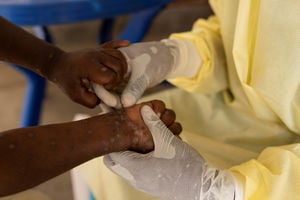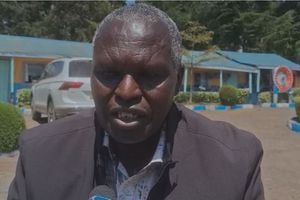Africa CDC declares Mpox a ‘public health emergency and security threat’ as virus hits 12 countries

Mpox is now a public health emergency in Africa
Mpox is now a public health emergency in Africa.
In a virtual press briefing,Africa Centres for Disease Control and Prevention (Africa CDC) Director General, Dr Jean Kaseya declared the virus a public health emergency of continental security.
This declaration comes as the disease has already affected 16 African countries and threatens 18 more with potential outbreaks.
The decision, according to Dr Kaseya was guided by science, available evidence and advice from health expert bodies around the world. All consulted partners, he said, had unanimously agreed to make the declaration.
“Today, with a heavy heart and an unyielding commitment to African citizens, I declare Mpox a public health emergency of continental security in Africa. This declaration is not merely a formality, it’s a call to action. We can no longer afford to be reactive but proactive. We will enhance global response to mitigate impact, and protect public health while minimizing disruption of movement and trade,” said Dr Kaseya.
He adds: “This is not just an African issue; it is a global threat that knows no boundary. Mpox has now crossed borders, affecting people across the continent and ripping families apart. We declare this today to mobilise our institutions and strengthen our health systems, educate communities and deliver lifesaving interventions where they are needed.”
While calling on international partners to support Africa at this critical hour, Dr Kaseya explained that Africa CDC will lead the fight by procuring and prioritising equitable distribution of vaccines. He also stated that they are working on securing more than 10 million vaccine doses, and promised that the vaccines will reach each country, community, and person who needs it.
“In the next two weeks, Africa CDC, working with all partners will be able to finalise a joint response plan coming from all national country pans that will be submitted to the Emergency consultative group. Today I signed an agreement, with the European Union Health Emergency Preparedness and Response Authority (HERA) and Bavarian Nordic, for the procurement and rapid distribution of 200,000 vaccines to Africa.
He asked African countries to fast-track emergency authorisation of Mpox vaccines.
He announced that the partners’ unanimous agreement to declare Mpox as a public health emergency of continental security was also informed by nine issues raised by the Emergency Consultative Group (ECG) –a committee of experts that advises Africa CDC’s Director General.
The issues include the limited available evidence and information on the number of cases and deaths, and the limited capacity to do testing and contact tracing.
Africa’s high burden of cases, coupled with an increasing number of cases was also a matter of concern, as well as high fatality rates. According to ECG, the proportion of diagnosed cases that lead to death is at a level considered too high. The ECG also linked immune deficiency from people living with HIV to fatal outcomes from Mpox.
Human-to-human transmission
Another matter of concern was data showing that infections being recorded were mostly from human-to-human transmission, as opposed to sexual or zoonotic transmission, which points to cross-border movement of infected individuals. The group also raised concerns on limited access to vaccines, unclear benefits of the vaccine and who to prioritise in vaccination, between healthcare workers, people with high levels of exposure, or family members with infected kin.
In a previous meeting, Dr Kaseya had raised concerns that 12 countries in the continent (Benin, Cameroon, Central African Republic, Democratic Republic of Congo, Gabon, Ghana, Ivory Coast, Liberia, Nigeria, Sierra Leone and South Sudan) that have been known to be endemic for Mpox, have recorded higher numbers between 2023 and 2024, compared to the same period between 2022 and 2023.
He also raised alarm on new cases being reported in countries such as Burundi, Kenya, Rwanda and Uganda, which have never recorded any Mpox cases in history.
About two weeks ago, the Africa CDC recorded 887 new cases and five new deaths that they have attributed to cross-border transmission, long-distance truck drivers, trade, healthcare seeking and sexual transmission. The older cases have been attributed to cross-border movements caused by insecurity, civil wars and climate change.
He also raised an alarming number of cases among children, which have been attributed to endemic exposure, malnutrition and poor immunity, which makes children more vulnerable. Children are also at a disadvantage, compared to adults, who received some level of protection from being vaccinated against smallpox.
Another pandemic
According to Dr Kaseya, the declaration is part of Africa CDC's mandate at the continental level to control the outbreak and prevent it from becoming another pandemic.
Following the declaration, a summit of African heads of state is expected to be organised urgently to discuss the response that Africans and partners need to support their countries.
Africa CDC will then kick start the coordination of the international response and provide support to countries to contain the outbreak. Member states will actively, promptly, and transparently begin to share information with the Africa CDC, including any health measures implemented in response to the emergency.
“When we declare a public health emergency of continental security, we are increasing funding, domestic resources, and partners' resources to support the outbreak. We are also increasing or enhancing the surveillance and the reporting because countries are expected to enhance their surveillance, including at point of entry,” said Dr Kaseya.
Already, Africa CDC has activated an Emergency Operations Center to support the preparedness and response efforts of African Union member states. This aims to enhance coordination and provide technical support. A team has also been deployed in DRC to provide regional response for all African Union member states affected.
International support
“Africa CDC will start to communicate regularly, having press conferences weekly. We will start to provide information to the public on how the outbreak is moving and what all of us are doing to fight the outbreak,” he added.
“The declaration will accelerate research and development of diagnostics. It will accelerate phase two and phase three stages of clinical trials and also scale up the production of vaccines. It will also help us to strengthen international support and solidarity, and encourage countries to support each other,” he said.
Dr Kaseya however explained that the response towards eradicating Mpox is hindered by stumbling blocks such as insecurity, co-infections between m-pox and other diseases such as HIV/AIDS, inadequate global attention and investment, cross-border transmissions and unavailability or shortage of vaccines. The continent, he said, is also grappling with inadequate capacity to handle the complexity of the outbreak, at a time when it is also handling other humanitarian situations and critical outbreaks such as cholera and Ebola.
"We identify as a challenge, the unavailability of vaccines, therapeutics and diagnostics. The average rate of testing is only around 30 per cent. Today, we are just talking about almost 200,000 doses available yet we need at least 10 million doses," he said.
"We need to start with the available 200,000 doses while we are actively engaging several partners. I want to thank partners who are working with us to see how we can quickly finalise the clinical trials that are ongoing for us to have millions of doses next year to continue with this campaign. But we'll start with the 200,000 doses that are available very soon based on the vaccination plan that we are getting from countries," added Dr Kaseya.
Sh1.2 trillion
He explained that Africa CDC will use part of about Sh1.2 trillion (USD10 million) contributions that it received from the Permanent Representatives Committee of the African Union to handle the Mpox outbreak, for procurement of the vaccine.
In the meantime, the available vaccines will be distributed, considering countries that already have a vaccination plan, hotspots, and areas of active transmission, and most vulnerable populations such as healthcare workers, people living with HIV and cases that have been already identified.
While this goes on, community health promoters will be roped in to strengthen surveillance and contact tracing of those that have been identified.
According to Dr Tedros Ghebreyesus, WHO Director General, a new strain of Mpox virus, called Clade 1b, has been confirmed in Kenya, Rwanda and Uganda. This strain causes more severe disease than clade 2, which has caused the current outbreak in the Democratic Republic of Congo.
Mpox is a viral illness characterised by painful rashes and flu-like symptoms, including fever, headaches, and body aches. It spreads through direct contact, either from person to person or from animals to humans.





